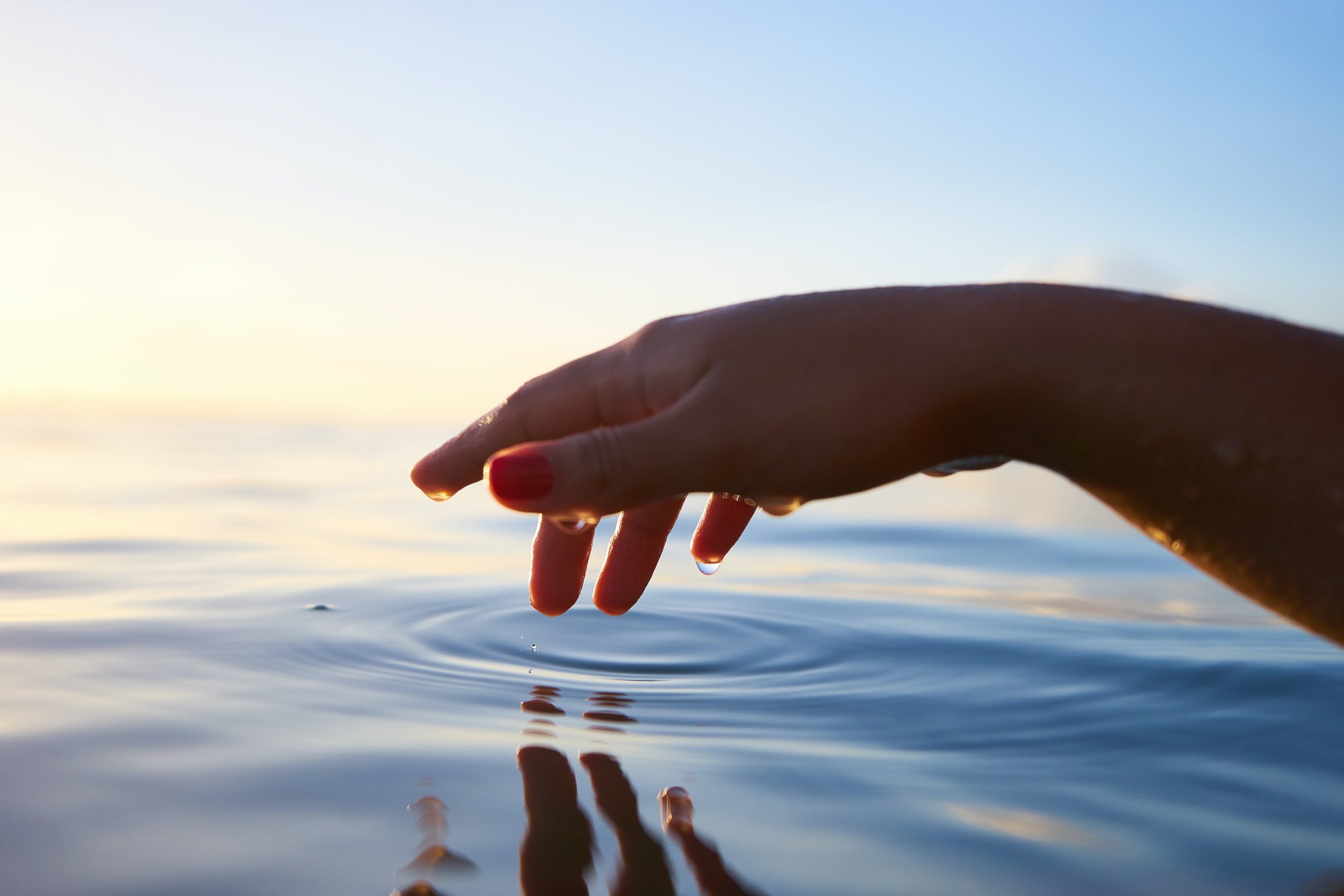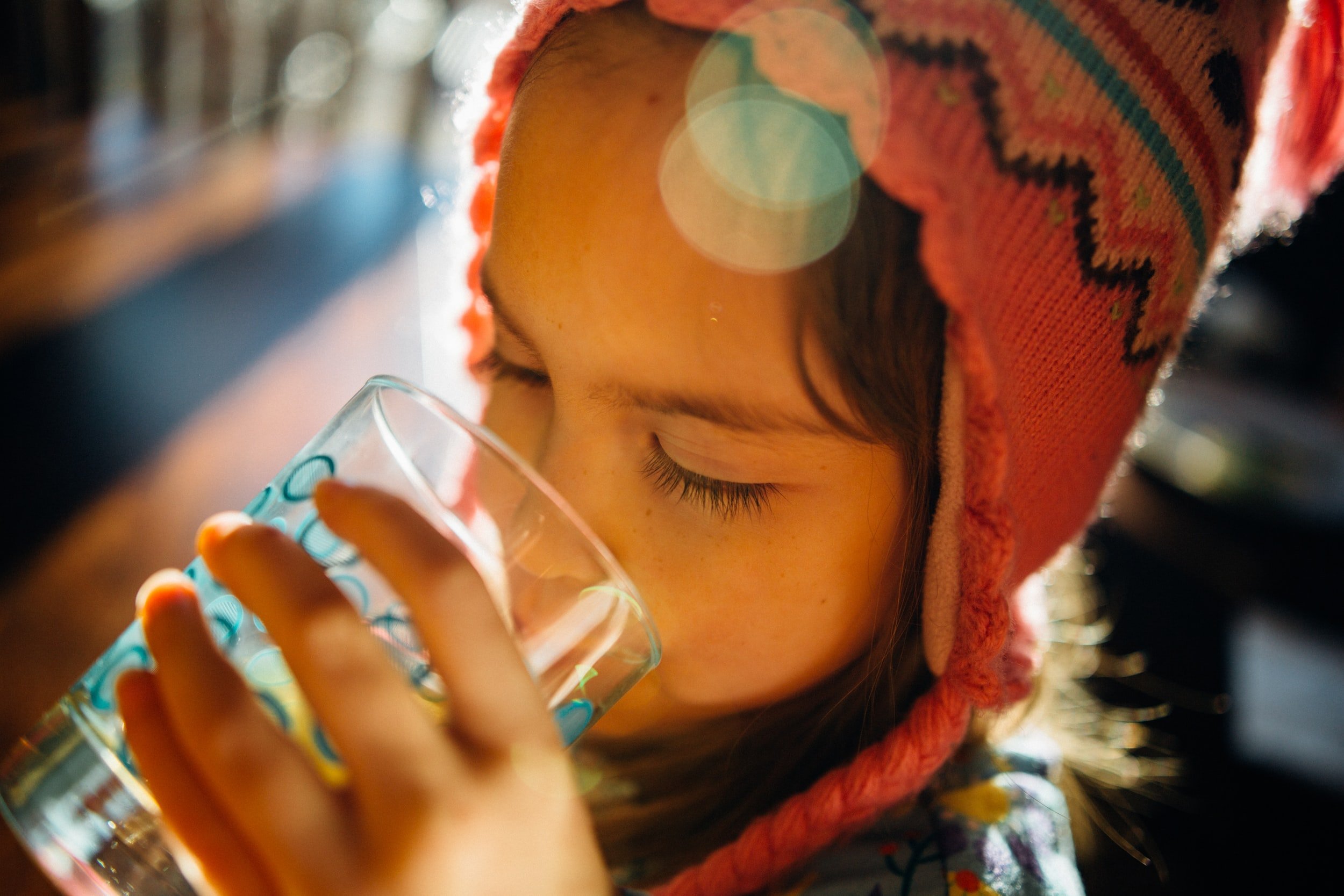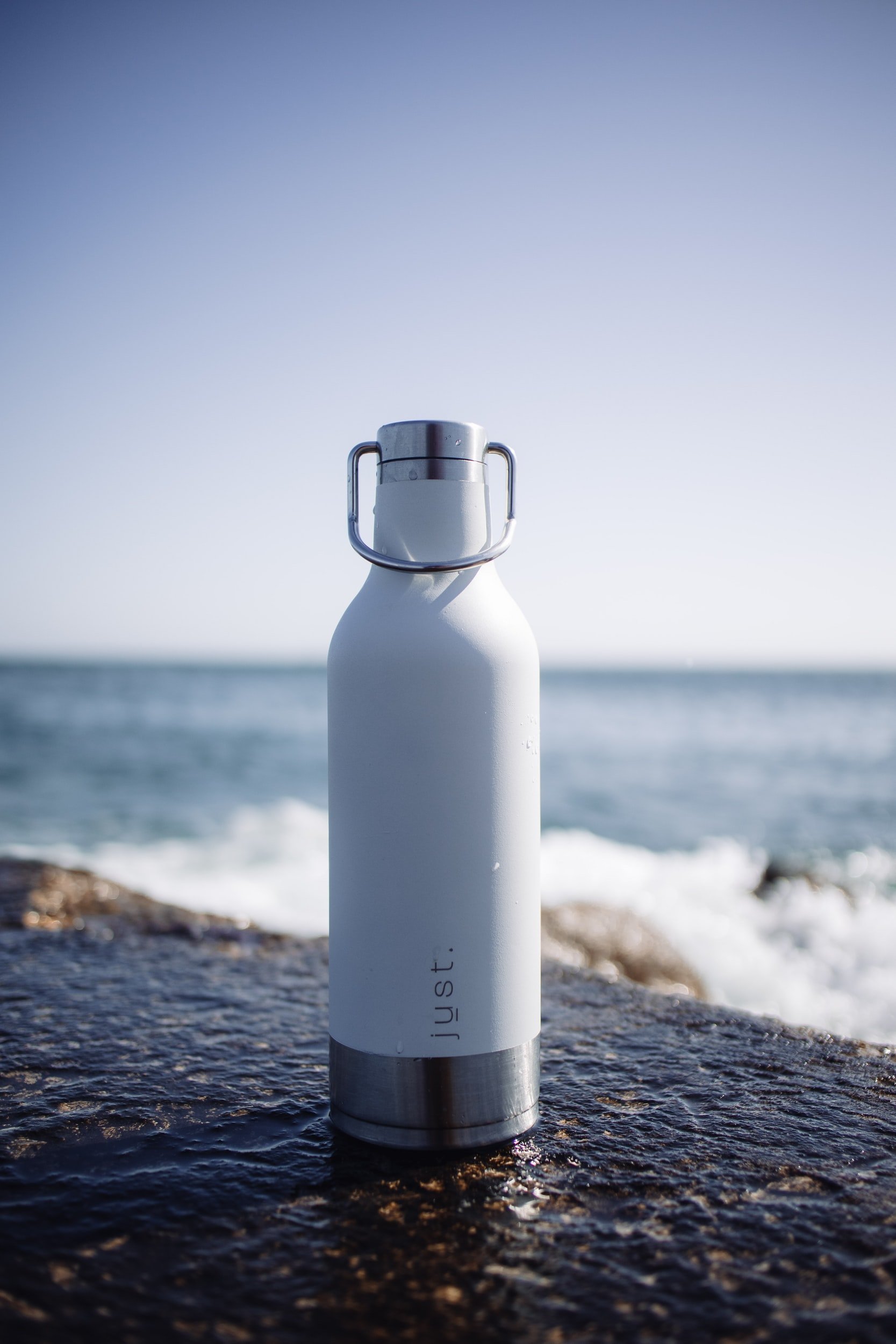Why all the fuss about drinking enough water?
Did you know that one of the easiest things we can do to improve our health is also one of the most beneficial?
In this article I will show you how you can calculate how much water you should be drinking, and how chronic dehydration can lead to some surprising symptoms. I’ll also share ways to spice up the flavor, and strategies I use to ensure I get my daily requirements.
Water makes up at least 50% of adult body weight and is essential for life.
Essential, that’s right! Nearly every organ in the body requires water to do its job 1. Keeping your body properly hydrated improves detoxification, immune health, digestion, joint health and cardiovascular health…and that’s just a drop in the bucket!
not getting enough water can be detrimental.
Acute dehydration can happen with exertion and in hot climates, and can cause dizziness, poor concentration, fatigue, muscle cramps, nausea, rapid heartbeat, fever, headaches, weakness, heatstroke and low blood pressure 2.
And when the body is consistently deprived of sufficient water, a multitude of symptoms can occur.
Chronic dehydration is implicated in numerous seemingly unrelated health conditions and symptoms, including fatigue, skin conditions, gout, constipation, cognitive decline, increased pain sensitivity, headaches, increased risks of kidney stones, chronic kidney disease, muscle and joint pain, urinary tract infections, cardiovascular diseases and metabolic disease. Indeed, water intake has even been reported to affect mood and cognitive function 3,4.
So, what about the benefits?
There are FAR more benefits of drinking water than will fit on this list, but here are a few to get you motivated:
Immunity – Our immune system depends on our bloodstream to bring nutrients and carry away waste and toxins, and our blood is mostly made of water! Water is also important for lymphatic drainage, which is really important when we are sick…since that’s where most of our infection-fighting white blood cells carry out their duties 5.
Improved digestion – Our digestive system uses large amounts of water; it is required to produce and secrete digestive enzymes and it also helps move food through the digestive system and prevents constipation. However, it is best to avoid water during meals as it dilutes digestive secretions. Avoid water about 30 minutes before, and 1 hour after meals 1.
Detoxification - Water helps dissolve and transport toxins and waste from the body. And since it helps prevent constipation, it reduces the time feces lingers in the bowel which can lead to toxins from waste being reabsorbed into the bloodstream. Sufficient water also supports the kidneys in filtering out these wastes. People that have an increased toxic load can experience a range of symptoms, including allergies, fatigue, skin conditions, hormonal imbalances, and much more 3.
Healthy joints – Water is required for the production of synovial fluid that lubricates and cushions joints 1.
Cardiovascular health – Since blood plasma is 92% water, dehydration can thicken the blood and compromise circulation 6. A research study published in 2020 showed a decrease in systolic blood pressure in the group that drank more water. This was suggested to be due to improved kidney function and normalization of hormones that affect blood pressure, and a decrease in peripheral resistance 4. The same study showed hydrated participants had a higher body temperature, suggesting improved metabolism, which may be implicated in claims that hydration helps maintain a healthy weight.
But I’m not thirsty!
You might wonder how you can be dehydrated if you aren’t thirsty. For one thing, our sense of thirst dulls as we age, and is not yet fully developed in children 7. But more importantly, those that are chronically dehydrated typically have a dampened sense of thirst. This is because ignoring the feeling of thirst over time can cause the body to stop sending the thirst signal in a process called neural adaptation.
However, once re-hydrated, it is thought that the thirst signal will normalise. Studies have also shown that for some, thirst can be confused for hunger which can lead to over-eating when water may have satisfied that urge 8.
How much water should I drink?
The European Food Safety Authority has defined adequate intake as 2 L/day for females and 2.5 L/day for males 9. However, this doesn’t take into account varying body weight or activity levels. The larger you are, the more water your body requires. So, I recommend people drink at least half of their body weight (in pounds) in ounces of water. For example, if you weigh 140 pounds, drink 70 ounces of water each day. The metric conversion is multiplying your body weight in kg by 3% to calculate number of liters. For example, if you weigh 70 kg, drink 2.1 litres, or 2100 mL of water each day. This is assuming a moderate activity level and moderate environmental temperature. If you are losing water via sweat from the heat or exertion, re-hydrate with your own DIY sports drinks, recipes here.
CALCULATE YOUR PERSONAL WATer INTAKE GOAL:
Body weight in kg x .03 = daily water in liters. (e.g. 70 kgs x 3% = 2.1 litres H2O/day)
Body weight in lbs x .5 = daily water in take in ounces (e.g. 150 lbs divided by 2 = 75 ounces H2O/day)
What are you drinking instead?
Current trends indicate people are drinking more caffeinated and sugary drinks than ever. This includes energy drinks, coffee, black tea, soda and even fruit juice. These types of drinks do not provide hydration for the body, in fact, some actually dehydrate the body:
Caffeine and alcohol have a diuretic effect on the body, which increases water excretion, reducing the amount of fluid in your body 5.
Sugary drinks (fructose-containing drinks, such as sodas and fruit juice) can increase dehydration and the likelihood of renal injury by altering the production of hormones that regulate water retention and excretion 10.
Bottom line? Swap these types of drinks for water. If you drink alcohol, it takes about 2 glasses of water to replenish water lost from 1 alcoholic drink.
DRINKING WATER TIPS
Not everyone likes water, and for those of us that do, it can still be a struggle getting our daily allotment. Here are a few tips to increase water intake, and enjoy it!
Measure out your recommended amount of daily water every morning, and make sure you drink it by the end of the day
Get a stainless steel or glass water bottle to take with you, and make it a habit to have it wherever you are
Use a hydration app to remind you to drink water
Eat plenty of fresh fruits and vegetables which have a high moisture content
If you don’t like the taste of water, try adding a squeeze of lemon, cucumber slices, crushed mint, ginger, frozen berries or a few drops of stevia extract. You can also make up a batch of iced herbal tea (hibiscus, rooibos, mint) -YES, herbal teas count as water intake! You can even make your own carbonated water, fizzy is fine as long as there is no added sugar.
Invest in a water filter - Help out your liver by filtering your tap water. Chemicals, heavy metals, micro-plastics and other impurities have been found in tap water, these can increase the toxic load on the body and deleteriously affect health 11,12.
My routine
Easy as 1-2-3
First thing in the morning, I drink a large glass of water with a squeeze of lemon
Next, I fill my 1.5-litre stainless water bottle, add my daily intake of mineral drops, and take this with me to drink throughout the day
After I've digested dinner and before going to sleep, I drink another small glass of water
That sounds easy simple, right? Time to find the tricks that work for you…I know you’ll feel the difference.
Yours in health,
Camille Hoffman
Naturopath, Nutritionist and Medical Herbalist
Book Your Free Discovery Call Here
The views and nutrition, naturopathic and herbal recommendations expressed by Camille Hoffman and Hoffman Natural Health’s programs, website, publications and newsletters, do not constitute a practitioner-patient relationship, are not intended to be a substitute for conventional medical service and are for informational purposes only. The statements and content found in these programs, website, publications and newsletters have not been evaluated by the Food and Drug Administration. The treatments described may have known and unknown side effects and health hazards. Each user is solely responsible for their own healthcare choices and decisions. Camille Hoffman advises the website user to discuss these ideas with a healthcare professional or physician before trying them. Camille Hoffman does not accept any responsibility for any positive or adverse effects a person claims to experience, directly or indirectly, from the ideas and contents of this website.
SOURCES
1. Harvard School of Public Health. (n.d.). Water. Retrieved from https://www.hsph.harvard.edu/nutritionsource/water
2. Medline Plus. (2021). Dehydration. Retrieved from https://medlineplus.gov/dehydration.html
3. Nakamura, Y. et al. (2020). Effect of Increased Daily Water Intake and Hydration on Health in Japanese Adults. Nutrients, 12(4), 1191. doi:https://www.doi.org/10.3390/nu12041191
4. Noland, D. et al. (2020). Integrative and functional medical nutrition therapy: principles and practices. Springer Nature.
5. Craft, J. & Gordon, C. (2015). Understanding pathophisiology. Elsvier Australia
6. Mathew, J. et al. (2021). Physiology, blood plasma. StatPearls. Retrieved from https://www.ncbi.nlm.nih.gov/books/NBK531504/
7. Kenney, W.L. & Chiu P. (2001). Influence of age on thirst and fluid intake. Medical Science Sports Exercise, 33(9), 1524-1532. doi:https://doi.org/10.1097/00005768-200109000-00016
8. McKiernan, F. et al. (2008). Relationships between human thirst, hunger, drinking, and feeding. Physiology & behavior, 94(5), 700-708. doi:https://doi.org/10.1016/j.physbeh.2008.04.007
9. EFSA Panel on Dietetic Products, Nutrition, and Allergies (NDA). (2010). Scientific Opinion on Dietary Reference Values for water. EFSA Journal, 8(3), 1459. doi: https://doi.org/10.2903/j.efsa.2010.1459
10. García-Arroyo, F. E. et al. (2016). Rehydration with soft drink-like beverages exacerbates dehydration and worsens dehydration-associated renal injury. American Journal of Physiology-Regulatory, Integrative and Comparative Physiology. doi:https://doi.org/10.1152/ajpregu.00354.2015
11. Koelmans, A. A. et al. (2019). Microplastics in freshwaters and drinking water: Critical review and assessment of data quality. Water research, 410-422. doi:https://doi.org/10.1016/j.watres.2019.02.054
12. Bradley, P. M. et al. (2021). Public and private tapwater: Comparative analysis of contaminant exposure and potential risk, Cape Cod, Massachusetts, USA. Environment international, 106487. doi:https://doi.org/10.1016/j.envint.2021.106487







